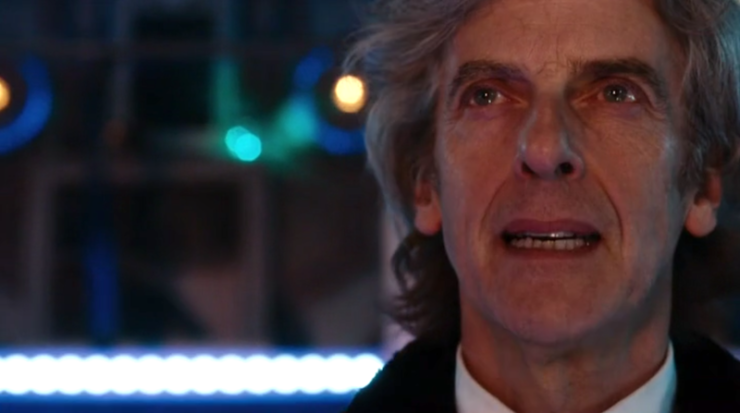The Twelfth Doctor has left us. It’s time for our collective mourning period, Whovians.
And this was one heck of a way to say goodbye.
Recap
The Twelfth Doctor runs into his first incarnation at the South Pole, both of them refusing to regenerate. As they are meeting, they come across a World War I captain who has stumbled into their timeline. A glass entity shows up and to collect the captain; it is part of a group from the far future called Testimony, who harvests something from people in the past, moments before their deaths. They must return the captain to his death or disrupt the timeline. When the Doctor refuses to give him back, they claim that they will return someone to him in exchange: Bill Potts. The Doctor isn’t sure that he believes that the person in front of him is the real Bill, as he believed her to be dead. He decides that they will all leave in the First Doctor’s TARDIS so that he can learn more about Testimony and stop them if they turn out to be awful.
He goes to the center of the universe, a general hellscape overrun by daleks. At that center is Rusty, the dalek the Doctor met in “Into the Dalek,” who is spending the ages murdering every dalek who tries to approach. The Doctor asks Rusty to tap into the dalek hivemind on his behalf for information on Testimony. He’s surprised by what he finds; Testimony is a project from New Earth created to briefly lift people directly before their deaths and round up all their memories into a living archive. Once the memories are forever stored, Testimony delivers the person back to their death with no memory of what happened. In short, it’s a very nice project and the version of Bill that the Doctor has been speaking to is the memories in Testimony. Both Doctors agree to bring the Captain back to the moment of his death, but the Twelfth Doctor can’t resist fussing with the timeline; he finagles it so that the Christmas Truce interrupts the Captain’s death and he lives after all. (They also find out that the Captain is, as many fans suspected, the grandfather of the Doctor’s dear friend—Brigadier Lethbridge-Stewart.)
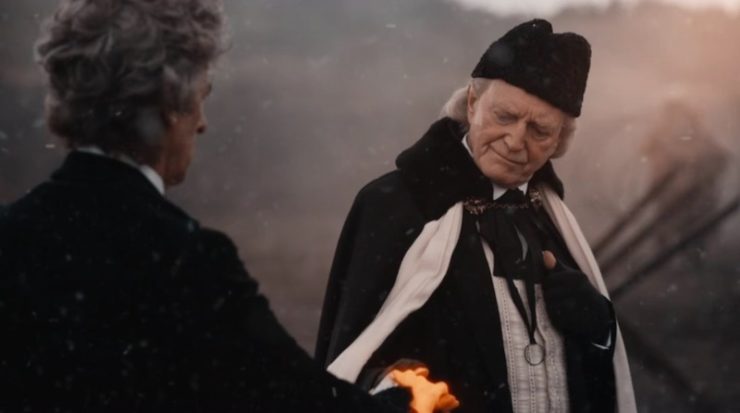
After the ordeal, the First Doctor realizes why he must regenerate and bids the Twelfth Doctor goodbye. Bill arrives to see the Doctor off, but he’s still not sure of her. Bill insists that people are the sum of their memories, hence, she is truly Bill. In order to prove to the Doctor how important memory is, Bill restores the Doctor’s memories of Clara. The Doctor bids a tearful goodbye to Bill and Nardole, telling them that he has to make the choice about whether or not to regenerate alone. The TARDIS seems to be pleading with him when he gets back on the ship, and he finally decides that he might as well keep going for one more round. Before he goes, he gives advice to his future self, ending with “Be Kind.” Then he lets go—
—and the Thirteenth Doctor arrives. She utters the words “Oh, brilliant” before the TARDIS proceeds to explode and she falls out the doors.
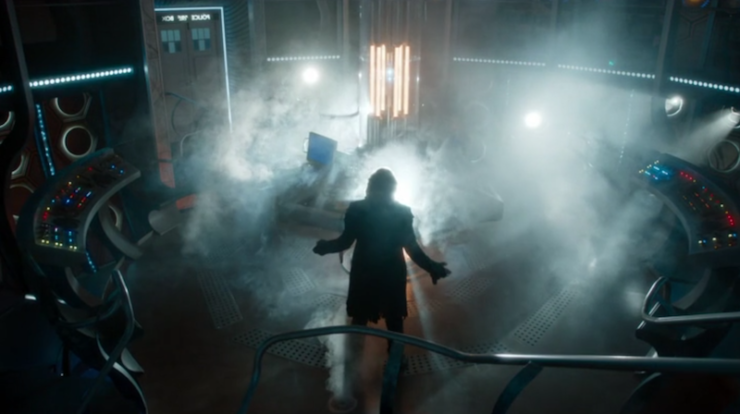
Commentary
To my mind, this episode was a perfect summation of Steven Moffat’s era as Doctor Who showrunner–the story itself was often creaky and underwhelming, but the actors were all superb and when the emotional scenes and monologues really hit, all the creaky bits just fell away. It’s hard to praise Peter Capaldi enough as the Twelfth Doctor. His gentleness and wisdom make his incarnation of the character comforting beyond words. His regeneration scene is already up there with the very best, and letting him go was always going to be a trial.
The episode is deliberately cognizant of this, and there are places where Moffat has dropped in meta dialogue to that end; Bill makes a point of telling the Doctor that the hardest part of traveling with him was “letting the Doctor go,” which he tells her is not something that the real Bill Potts would ever say. Perhaps that is true, but it’s really not about Bill—it’s about us. Letting the Doctor go is the hardest part and it doesn’t really matter how many times you’ve been through it.
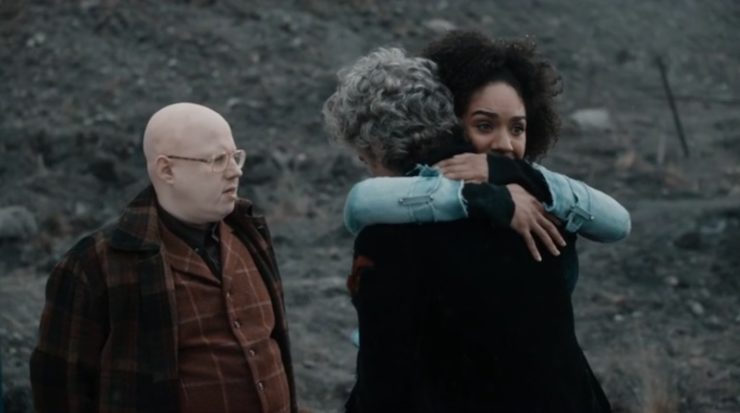
Parts of this episode telegraph a bit too much to make the adventure exciting. Fans knew from the moment they set eyes on Mark Gatiss in the trailer that he would be related to the Brigadier. The stakes aren’t set that high in the first place, knowing that most of the characters are essentially dead or dying, which makes it even harder to care if the Doctor stops the captain’s death. And if you know anything at all about World War I, you can kind of guess that the 1914 Christmas Truce is going to play into the Doctor’s endgame. The appearance of the “center of the universe” as this strewn battlefield of broken stuff is pretty much the center square on Steven Moffat Doctor Who bingo, which makes tha entire section very hard to worry about. It doesn’t seem all that perilous because we’ve seen a million versions of this before.
Putting Rusty in the center is another weird continuity bit that ties into Capaldi’s early episodes in a way that doesn’t feel particularly important or interesting. The Doctor needing to go there for knowledge rather than Gallifrey makes the whole thing feel extra gimmicky. (The real point is that it needed to be somewhere other than Gallifrey because you can’t drag the First Doctor back home for information—as he went through so much trouble to run away from it in the first place.) The episode is just bogged down with sections like this, which is a shame as they would have been easy to sidestep with just a little extra imagination.
David Bradley is delightfully uncanny as the First Doctor, and it’s so enjoyable to watch he and Capaldi bounce off of one another. Steven Moffat chose to take a different tack in bringing back a character who is over fifty years old—rather than gloss over the First Doctor’s dated manner of interacting with companions (especially how he treated women), Moffat leans on it and has the Twelfth Doctor react in horror at the way he used to behave. On the one hand, it’s a unique way of taking the past to task for its shortcomings, getting the chance to tell the First Doctor that he really needs to get a handle on his superiority complex. On the other hand, there is something strange about trying to reconcile the history of a television show and the era in which it was produced by taking your previous main character and sort of swatting at him when he says the wrong things. After all, it’s not as though the episode has time to let people explain to the First Doctor what he’s doing wrong. So you end up with that odd sheen of oh, we know grandpa says things that are a little off sometimes, just try to roll your eyes at him. It’s not quite a useful as it could be, even if it is occasionally good for a laugh.
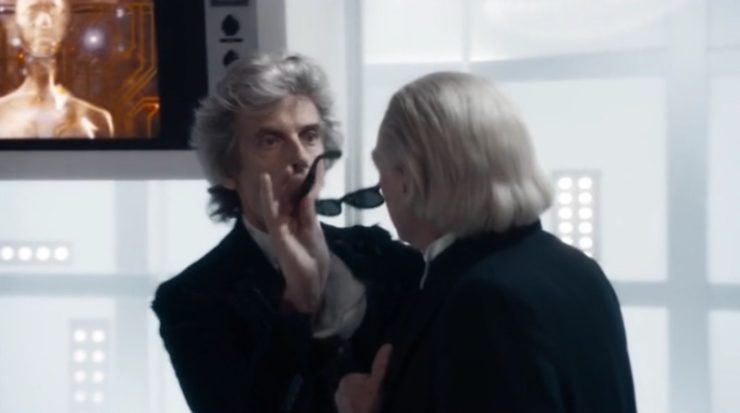
Multi-Doctor episodes tend to require this level of metafiction in order to run. Frankly, having the First Doctor behave in such a callous and sexist manner doesn’t really play with certain retcons that Moffat himself has already applied to the show’s mythology, specifically the way he has retconned Gallifrey; though the classic series tended to portray Time Lord society as corrupt and also extremely patriarchal and dismissive of women, Moffat reintroduced the Doctor’s people and planet to be much more diverse and egalitarian, even if only among themselves (they’re still pretty bad and treating other peoples and cultures with any consideration whatsoever). It made sense for the First Doctor to have come from the Gallifrey that we saw in the classic show… but that man doesn’t quite line up with the smoothed over state of things. Hence the metafictional aspect of this episode being very dense in order to work.
With the revelation of Clara and her reintroduction back into the Doctor’s memories, the Twelfth Doctor gets a beautiful gift that very likely informs his regeneration into a woman. After all, he now remembers Clara Oswald, the woman who he taught to be her very own Doctor. And she took that knowledge from him and literally ran with it. She’s already out there with Me, doing the good work for him. It makes perfect sense that remembering her would stick with him as he prepared to change.
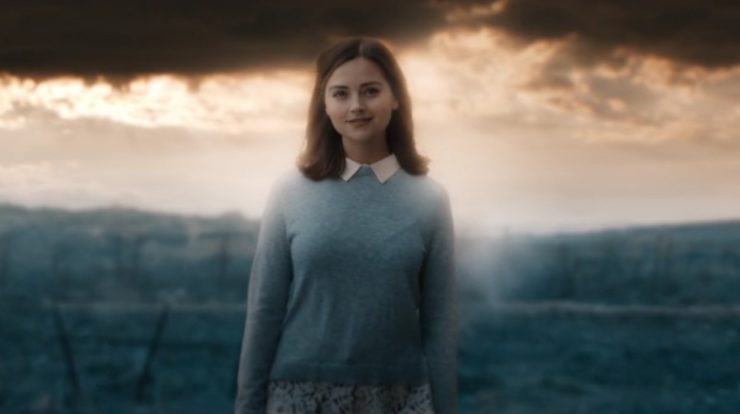
While it was initially worrisome at the end of “The Doctor Falls” to see the Twelfth Doctor waffling over regeneration in a way similar to the Tenth Doctor’s end, the story veered sharply away from that similarity as fast as it could. Instead of making it all about wanting to stay as this particular incarnation of himself, the Doctor eventually realizes that what he’s struggling with is the desire to let go. He has done a lot this time around, and he’s wondering if he ever gets the chance to sit out indefinitely. By being reminded of his first struggle with regeneration, he’s confronted with the truth of that decision—stopping then would have meant that no one was available to do all the things he has done. So he has to decide if he feels he’s earned it this time. The right to rest.
And the answer is maybe yes… but there’s no reason not to keep going for a bit to be absolutely sure.
The Doctor is bad at regeneration. He has admitted as much in show’s past, to the point where the Seventh Doctor lamented the process being like the lottery. Other Time Lords have a much easier go of it, partly because they seem capable of focusing on it. And that is what we see from the Twelfth Doctor. For the very first time, he thinks hard about who he wants to keep being and who he wants to become. He gives himself his best advice. He makes the choice to say goodbye, to let go, and to commit to what comes next. And when he emerges on the other side—she’s there.
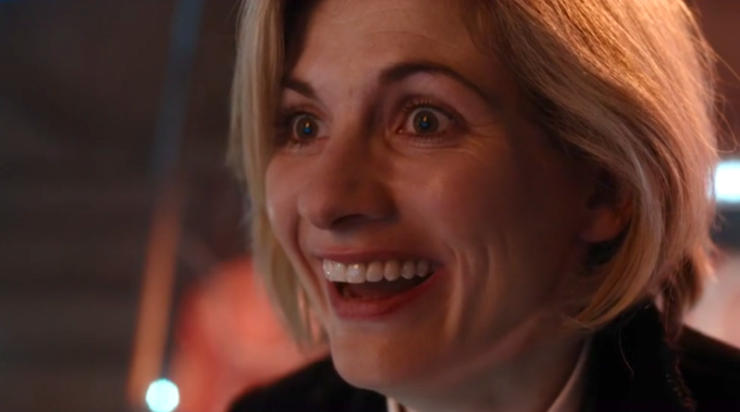
And, oh. She’s so happy to be there.
And… she crashing. Well. Some things never do change.
Little asides and references
- The constant comments about the size of the TARDIS windows is a meta in-joke for fans who have often complained at the ways that the TARDIS has changed over the years, particularly the size and placement of the box’s windows.
- Testimony is presumably a project that was created on New Earth sometime after the events of “Gridlock.”
- With the Captain Archibald’s request, this episode has retconned the Doctor’s relationship with the Brigadier and also Kate Lethbridge-Stewart, as the Doctor looking in on the family was also part of the promise made to the Brig’s grandfather.
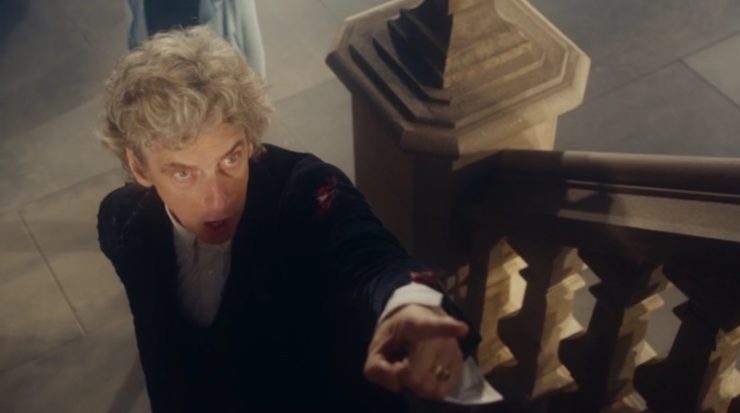
- The Doctor doesn’t want to believe the Testimony Bill is truly herself because she is merely a collection of Bill Potts’s memories. Bill argues that a person is their memories, therefore she is Bill. This is ironic because the Fifth Doctor made this is exact same argument in “The Five Doctors,” saying, “A man is the sum of his memories, you know. A Time Lord even moreso.”
- Compser Murray Gold pulled out all the stops for this episode, with thematic retreads of some of his earliest themes for the show, including “Doomsday” and the Ninth Doctor’s theme. Clara’s music also starts cropping up, hinting at her return.
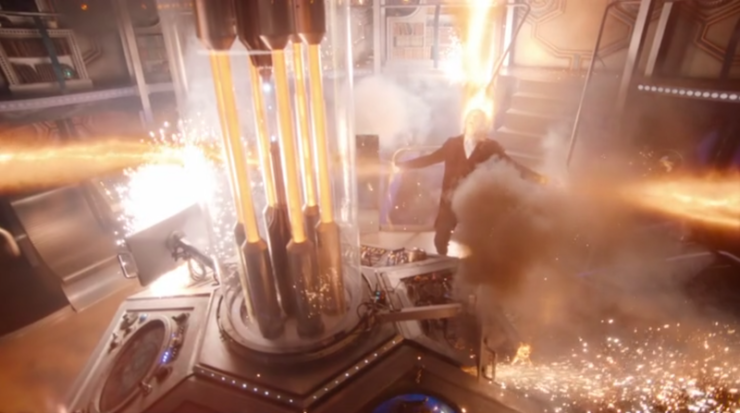
- This is the first time they’ve changed the regeneration special effect and sound since the Ninth Doctor’s regeneration.
Emmet Asher-Perrin is still crying, thanks. You can bug her on Twitter and Tumblr, and read more of her work here and elsewhere.










